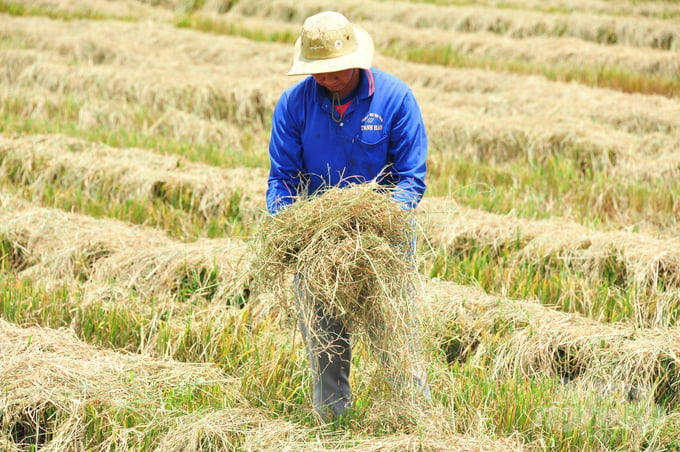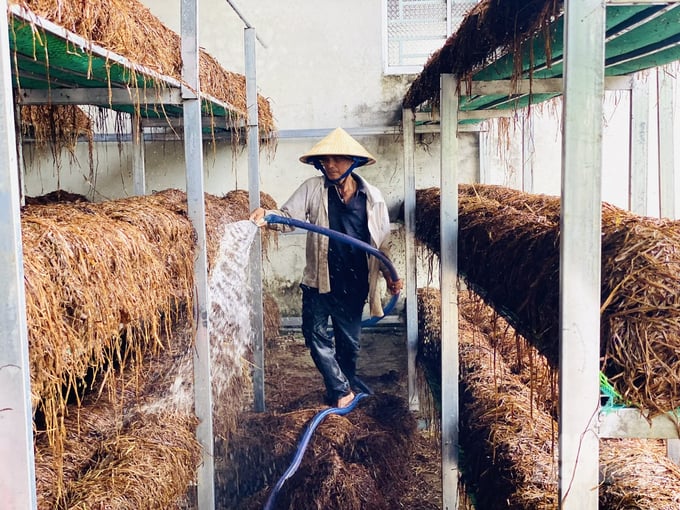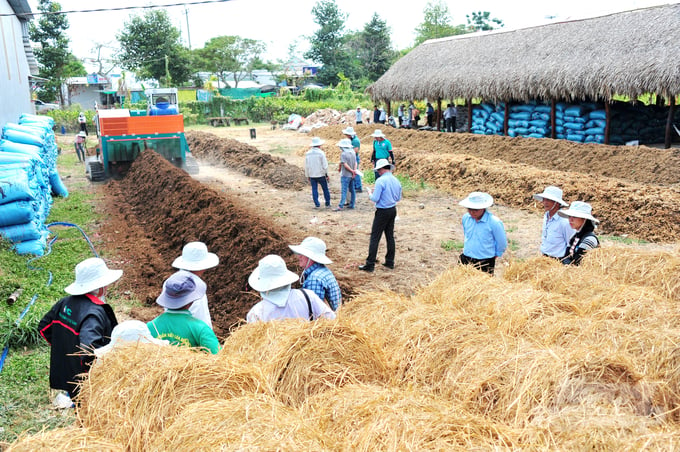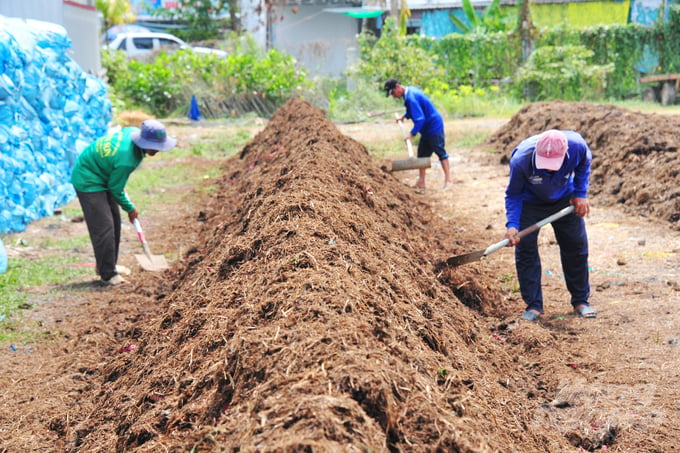May 24, 2025 | 16:19 GMT +7
May 24, 2025 | 16:19 GMT +7
Hotline: 0913.378.918
May 24, 2025 | 16:19 GMT +7
Hotline: 0913.378.918

After the rice harvest, a large amount of straw remains in the fields. Photo: Le Hoang Vu.
Can Tho’s agricultural sector, in collaboration with the International Rice Research Institute (IRRI) and other related units, has actively supported and guided farmers in managing and utilizing straw from rice production within a circular economy framework.
This program is part of the "One million hectares high-quality rice cultivation project", focusing on low-emission and green growth in the Mekong Delta region until 2030. Through this initiative, farmers have had the opportunity to increase their income and address the issue of no longer burning rice straw in the fields, which is both wasteful and environmentally harmful.
Accordingly, IRRI has signed and handed over a self-propelled organic fertilizer mixer to the Tien Thuan Agricultural and Service Cooperative in Thanh An Commune, Vinh Thanh District (Can Tho City) to help farmers process rice straw into organic fertilizer. At the same time, technical training was provided to cooperative members to develop the business model for producing organic fertilizer from straw.
According to Mr. Nguyen Cao Khai, Director of the Tien Thuan Cooperative (Thanh An Commune, Vinh Thanh District), the locality has an advantage in implementing the circular economy model due to the abundance of rice straw. However, collecting the straw remains challenging because of the high labor costs. Furthermore, since farmers do not yet know how to process straw into organic fertilizer and have not received technical training, they are unable to fully utilize this by-product. After learning from IRRI experts, farmers are eager to receive training soon to apply the organic fertilizer production process to increase their income.

The circular economy model from rice straw helps farmers increase their income while addressing the issue of burning straw in the fields, which is both wasteful and harmful to the environment. Photo: Le Hoang Vu.
Mr. Dong Van Canh, Director of the New Green Farm Cooperative (Tan Hung Ward, Thot Not District), shared that recently, farmers in the cooperative have been using rice straw from rice production to grow straw mushrooms, increasing their income through both outdoor and indoor mushroom cultivation models, which help manage unfavorable weather conditions. Moreover, the straw waste from mushroom cultivation is further reused to produce organic fertilizer for farming.
Currently, New Green Farm Cooperative is using straw waste from mushroom cultivation combined with other agricultural by-products like rice husk ash, coconut coir, and cow manure to produce organic fertilizer. This fertilizer provides essential nutrients for crops and is highly regarded for its quality by consumers. The production process involves several mixing and composting stages over approximately 45 days.

Can Tho's agricultural sector and IRRI have supported many farmers and cooperatives in implementing the process of turning rice straw into organic fertilizer. Photo: Le Hoang Vu.
Currently, the cooperative has 40 members and cultivates more than 40 hectares. The cooperative also provides services for 101 households covering an area of 148.78 hectares. With the support of Can Tho's agricultural sector and various research institutes and universities, farmers in the cooperative have implemented a circular agriculture model and managed rice straw in line with a circular economy approach since 2022.
To produce organic fertilizer from straw, the cooperative has applied machinery for mixing, suitable for large-scale production of tens of tons per batch, which helps save about 40-60% on labor costs.
According to representatives of the New Green Farm Cooperative, using organic fertilizer made from rice straw for rice cultivation, combined with the "1 Must, 5 Reductions" technique, allows farmers in the cooperative to reduce chemical fertilizer usage by 40% and significantly lower input costs. As a result, the profit from rice cultivation can increase by over 140 USD/ha. This model utilizes all by-products, enabling farmers to earn additional income from using straw to grow straw mushrooms.

The finished organic fertilizer made from rice straw is used to nourish crops. Photo: Le Hoang Vu.
According to Mrs. Pham Thi Minh Hieu, Director of the Can Tho City Crop Production and Plant Protection Sub-Department, following the initial success of the circular agriculture model at the New Green Farm Cooperative, the agricultural sector is continuing to collaborate with IRRI and related units to expand the model across the city. Efforts are ongoing to actively support farmers and cooperatives in accessing and applying technology processes, machinery and mechanized equipment for straw collection, utilization and processing into organic fertilizer. This not only enhances production value but also reduces the use of chemical fertilizers, thereby lowering greenhouse gas emissions.
Translated by Phuong Linh

(VAN) The People's Committee of Tra Vinh province has approved an adjustment to the investment policy for the Green Hydrogen Plant project, increasing its area to approximately 52.76 hectares.
![Reducing emissions from rice fields: [2] Farmers’ commitment to the soil](https://t.ex-cdn.com/nongnghiepmoitruong.vn/608w/files/news/2025/05/05/dsc08881jpg-nongnghiep-140632.jpg)
(VAN) Clean rice cultivation model in Thuong Tan commune, Bac Tan Uyen district, is assisting local residents in achieving sustainable agriculture by substantially reducing costs, increasing productivity, and protecting the environment.

(VAN) At the conference to disseminate Resolution No. 68, AgriS introduced its digital agricultural ecosystem and reaffirmed its commitment to accompanying the Government in promoting private sector development and sustainable agriculture.

(VAN) 'Blue Ocean - Blue Foods' initiative is designed to restore marine ecosystems and establish sustainable livelihoods for local communities by cultivating a minimum of 1,000 hectares of cottonii seaweed in the first three years.
/2025/05/21/4642-3-112707_603.jpg)
(VAN) The V-SCOPE project has made direct contributions to three out of six pillars of the Comprehensive Strategic Partnership between Vietnam and Australia.

(VAN) Facing the threat of rabies spreading to the community, Gia Lai province urgently carries out measures to vaccinate dogs and cats on a large scale.

(VAN) Disease-free livestock farming not only protects livestock herds but also stabilizes production and livelihoods for many farmers in Tuyen Quang.